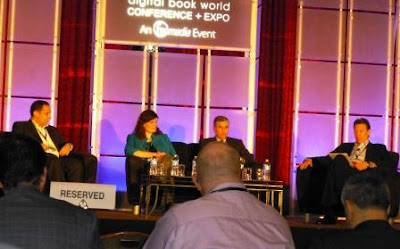It is always useful to recap developments in the industry, especially when the landscape is changing as quickly as it has been over the past several years. Featured here are some of the topics and insights from this year's Digital Book World conference.
On the topic of ...
DISCOVERABILITY
 |
| "Closing the New Book Discovery Gap": Angela Tribelli (HarperCollins Publishers) is second from left, and Matt Baldacci (St. Martin's Press) is second from right. |
This continues to surface as the holy grail with bookstores on the decline and old-fashioned "hand-selling" nearly impossible. Notable observations:
- Trends and publishing company leadership lean toward audience-specific marketing, enabled by social media. Audiences are more narrowly defined than they were in years past.
- There is a need for publishers to engage “authentically” in social media. (Angela Tribelli, Chief Marketing Officer, HarperCollins Publishers)
- Matt Baldacci (Vice President and Associate Publisher, St. Martin’s Press): Publishing needs more influential reviewers. Reviews were not supported by advertising in the past.
“Recommendations from friends make the sale.” (Jim Hilt, Vice President, eBooks, Barnes & Noble)Based on Jim Hilt's comment, publishers aim to simulate the endorsement of a friend by appealing to consumers directly and through natural, informal channels. Continue reading now, or subscribe (top left) to receive this blog via email.
E-BOOK SALES
Sales are thought
to be reaching a plateau—100% growth year over year is no longer happening.
- Many publishers expect e-books to account for 50% of their sales as early as next year. (James McQuivey, VP, Principal Analyst, Forrester Research)
- Kobo is excited about their foray into 450 US independent bookstores. These buyers buy more expensive e-books ($9.99 is a popular price point). (Michael Tamblyn, Chief Content Officer, Kobo, Inc.)
TABLETS
 |
| "A CEO's View of the Future": From left to right, Marcus Leaver (Quarto), Karen Lotz (Candlewick), Gary Gentel (Houghton Mifflin Harcourt),and moderator David Nussbaum. Boston publishing represents! |
- “The biggest impact of tablets is that it forces us to be better at what we do. Tablet readers are one click away from the rest of the world.” (Gary Gentel, President, Houghton Mifflin Harcourt)
- Tablets opens the market for “shorts”—content that can be read quickly. (Gary Gentel, President, Houghton Mifflin Harcourt)
- Prior to tablets—which showcase full-color art—children’s publishers focused on the Young Adult (YA) market. (Karen Lotz, President and Publisher, Candlewick Press)
PENGUIN RANDOM HOUSE MERGER
 |
| "Investing in the Publishing Industry": Brian Napack (Providence Equity Partners) and Michael Cader (Founder, Publishers Marketplace) |
- Mike Shatzkin (Founder and CEO, The Idea Logical Company) predicts that the merger will lead to the enlarged company developing a subscription book club channel of its own
- On scale (size): The advantages are that the largest publishers can bid highest for top authors and projects, and they can support those authors with marketing (Brian Napack, Senior Advisor, Providence Equity Partners; former President of Macmillan).
- Simon Lipskar (Agent, Writer’s House) thinks that the Penguin Random merger will lead to a retail venture, and probably a physical retail environment.
GLOBAL SALES
- E-book sales channels open up global markets, but rights are an issue.
- Agents sell rights individually for the benefit of authors (Brian DeFiore, Founder, DeFiore and Company)
AGENTS AND SELF-PUBLISHING
 |
| "Straddling the Models: Authors Choosing to Both Self- and Traditionally Publish." |
- Agents are enabling self-publishing of out-of-print titles, unsold titles, and titles belonging to authors who request assistance.
- Agents are careful to say that they are not becoming publishers themselves. They sell other rights to a title when it is initially published online.
- Success varies by genre: Romance and Young Adult lead the pack. With literary fiction, the author must have a reputation first in order to succeed independently.


No comments:
Post a Comment